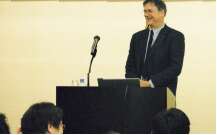

On April 2, Dr. Timothy Hunt, who was awarded the Nobel Prize in Physiology or Medicine 2001 for the discoveries of key regulators of the cell cycle, gave a lecture titled "Protein synthesis, Proteolysis, and the Control of cell cycle transitions" in the International Hall at Kyushu University, Hakozaki Campus. Dr. Takeharu Nishimoto, Professor, Faculty of Medical Sciences has written a few memories of his friend, Dr. Hunt.
On April 2, when spring was in full bloom, Tim kindly gave a lecture at Kyushu University despite his busy schedule while visiting Japan. He and I first met in Fukuoka City about 12 years ago at a conference of cell cycle jointly hosted by Professor Yanagida, Kyoto University, and myself. Ever since that conference Tim and I have been close friends. Fukuoka was the first place in Japan that he ever visited. At another lecture, Tim mentioned to me that he felt a little tense when he first met Japanese people, however, this relieved as he got used to the openness of people in Fukuoka and the sanguine nature that appears when they drink together. I guess he likes Fukuoka very much from the fact he has visited this place several times after the conference. Every time he visits Kyudai, I ask him to give a lecture at the Science Department or Medical School. He loves science and also loves to talk about science. When he warms to the lecture, he speaks quickly but still runs out of time. Although it is sometimes difficult for Japanese to listen to his lecture, afterwards, I am always invigorated. At this lecture, which was right after his award of the Nobel Prize, many people who were not specialized in the cell cycle field came to listen to the lecture. Tim was kind enough to talk not only about his specialized area but also told some stories of how he first became interested in science and how he won the prize. The audience enjoyed listening to his lecture and I am sure they were impressed by his passion for his research.

The Kyushu University Council held on January 22 adopted the gKyushu University Research Charter,h which follows the adoption of the Kyushu University Education Charter on November 21, 2000. This Charter clearly describes the research principles to be pursued by Kyushu University. It also shows the ideal format of the university.
Article 1 (The Purpose of This Charter)
Kyushu University proclaims this Charter of Research in order to promote research activities that will contribute, as the foundation of the pursuit, creation and development of better knowledge, to mankind and society.
Article 2 (The Role of Research)
(1) As the highest seat of learning, Kyushu University, with sincere respect for the long tradition of the pursuit of truth by mankind and for the human wisdom realized therein, shall carry out its mission of handing down this basic attitude to future generations.
(2) Kyushu University shall also recognize its role as an institution of producing the most progressive and world-renowned knowledge by developing perspectives from the basic researches in the various fields of culture and science.
Article 3 (The Idea of Research and ItsEthical Character)
(1) While respecting tradition and the pursuit of wisdom therein, Kyushu University shall endeavour to deepen and develop knowledge that will meet the needs of contemporary society.
(2) Kyushu University shall ascribe the highest value to creative and original research and pay the utmost respect to academic freedom and the autonomy of researchers.
(3) Kyushu University shall endeavour to establish harmony between the pursuits of human wisdom and scientific knowledge while pursuing practical values in various academic fields.
(4) While paying constant attention to the possible influences of science on the natural environment and the survival of human beings, Kyushu University shall endeavour, according to its conscience and good sense, to promote research activities that respect human life and human dignity.
Article 4 (The Social and International Contribution of Research)
(1) While maintaining the spirit of the pursuit of truth that embodies the idea of a university, Kyushu University shall contribute to achieving human welfare, the development of culture and the peace of the world through its research activities.
(2) Research in Kyushu University shall not only make best efforts to fulfil multiple social needs in order to achieve universality and utility but also aim to contribute to both the local community and the region within which Kyushu University is located.
(3) As an institution open to the public, Kyushu University shall freely disclose its research results. It shall endeavour to establish an international foothold promoting exchange programs of researchers and linkage with other institutions and enterprises as well as actively dispatching information to the world.
Article 5 (Cooperation between Research and Education)
With regard to the university role of education and of nurturing and producing persons of international capabilities, Kyushu University shall endeavour, based upon the harmonious cooperation of functions between research and education, to bring up persons to whom we can entrust our future.
Article 6 (The Principle of Unity)
Kyushu University shall adopt a united approach in pursuit of the above purpose and principles. In order to achieve this, all staff members and students shall cooperate and unite together. They shall be well aware of their roles and functions and make every effort to perform their responsibilities.
Previous
PageTop
Next


